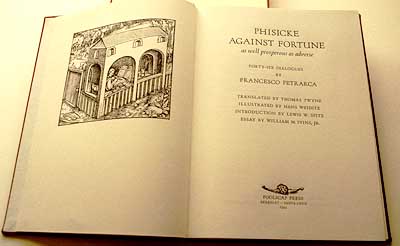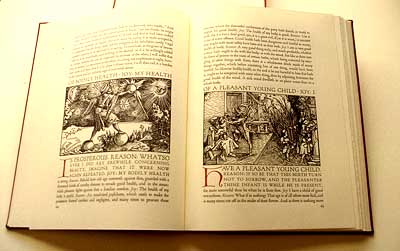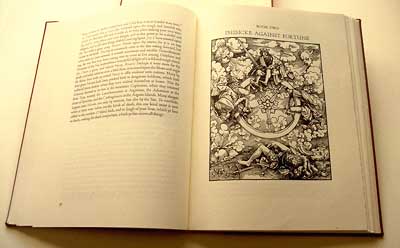
Introduction by Lewis W. Spitz
Lewis W. Spitz, William R. Kenan, Jr. University Professor, Professor of history at Stanford University, brings his considerable scholarship to the question of Petrarch's influence on the northern Renaissance, as well as providing an overview of Petrarch's written works. Through background and example, he shows why Phisicke Against Fortune is, as he says, "a mirror for mankind".
Illustrations by Hans Weiditz
Hans Weiditz (c.1494-1536) was an important member of the small group of outstanding woodcut designers of the German Renaissance whose membership included Albrect Dürer, Hans Holbein, and Hans Burgkmir. The fact that he was nearly alone in illustrating a great number of secular books makes him in many ways a more interesting artist than his more famous colleagues. Weiditz is best known for his illustrations for "Brunfels' Herbal", which is recognized as the most important herbal of the period and the first botanical book to contain realistic and accurate illustrations. Weiditz's imagination and close observation of real life show most clearly in this herbal and his handling of the woodcuts for the dialogues of Petrarch. In illustrating Phisicke Against Fortune Weiditz demonstrates his highly individualized style and addresses an astounding range of issues, among which are: an individual's relationship to society; secular versus religious perspective; how we perceive and respond to nature and natural laws; and how we behave toward each other. As an appendix to the text we have included notes on the Weiditz illustrations based on information from Walther Scheidig and translated especially for this edition from the German by Beate Reid.

Essay by William M. Ivins, Jr.
In his essay on Han Weiditz, William Ivins, Jr. (1881-1961), former Curator of Prints at the Museum of Modern Art, shares his infectious enthusiasm for the artist whose life had remained largely unappreciated until modern scholarship brought to light his great contribution to German Renaissance art.
Translation by Thomas Twyne
The Elizabethan Age was great both for the depth of its literature and the translations into English of many foreign works. Thomas Twyne's translation of Phisicke Against Fortune, from Latin into English, was completed in 1579. Now, newly transcribed from the Elizabethan black letter, with the spelling and punctuation standardized, Twyne's translation can be clearly enjoyed. We have retained intact the particular character of the work and the marvelous flavor of the language.

This edition brings together for the first time Thomas Twyne's translation of Phisicke Against Fortune and Hans Weiditz's wonderful woodcut illustrations which were made for the German edition of 1532. The original German edition contained two hundred and sixty-one woodcuts illustrating all of Petrarch's dialogues. We have selected forty-six dialogues that represent the enduring wisdom of Petrarch and the impressive imagery of Weiditz. Limited to 175 copies, each book measures 12 x 9 inches and consists of 160 pages printed letterpress on Lana Royal, a mould-made paper from France. The text was set in Monotype as well as handset type using Poliphilus, Bembo Italic and Forum, with Calligraph Initials printed in red. The book is hand-sewn and the rounded spine is covered in red Japanese cloth and is stamped in gold. Printed paper sides cover the boards. Of the edition, 40 copies are bound in quarter goatskin and red Japanese cloth, each in a slipcase covered in cloth and printed paper sides. The design, printing, and binding was done at Foolscap Press by Peggy Gotthold and Lawrence G. Van Velzer.
To Order
The price is $285. The 40 copies bound in quarter leather are $400. A few copies will be held in sheets for bookbinders, priced at $257. Sales and transit taxes apply to California residents. Please include $7. for shipping and handling. Discounts are applied to orders from book dealers and institutions. Payment for foreign orders should be made in U.S. funds. Orders may be placed to:
FOOLSCAP PRESS
412 Trevethan Avenue
Santa Cruz, CA 95062. USA
Telephone: 831-429-6489
e-mail: foolscap@cruzio.com
Fax: 831-429-6484
| hosted by: | COLOPHON PAGE | GALLERY | MARKETPLACE | SEARCH | JOURNAL | CALENDAR | FORUM | FEEDBACK |